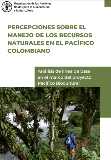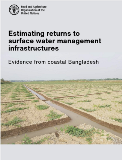
Estimating returns to surface water management infrastructures: Evidence from coastal Bangladesh
2024
Climate change poses a challenge to agricultural production in coastal Bangladesh, exacerbating vulnerabilities through rising sea levels, erratic precipitation, and saline intrusion, and threatening millions of farmers' livelihoods. In response, the Ministry of Agriculture of Bangladesh, with support from IFAD and FAO-TA, has implemented the SACP. This study employs an IPWRA model to estimate the impacts of irrigation and flood management infrastructures on agricultural production.
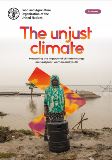
The unjust climate. Measuring the impacts of climate change on the rural poor, women and youth: Annexes
2024
These annexes are supplementing "The unjust climate - Measuring the impacts of climate change on rural poor, women and youth" report, offering in-depth insights into the dataset, methodology and results. It serves to validate our findings through rigorous analysis and provides additional context for understanding the global impact of climate stressors on rural livelihoods.
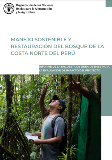
Manejo sostenible y restauración del bosque de la costa norte del Perú: Informe de la encuesta de línea de base para la evaluación de impacto del proyecto
2024
This baseline report provides insights into the project beneficiaries' socioeconomic status, land use, and agricultural activities. This information helps project implementers guide their activities and identify where possible problems may arise. Additionally, the report establishes whether there are any differences between those beneficiaries selected for treatment and those that, ex-ante, were identified as an appropriate control group.
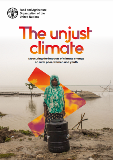
The unjust climate: Measuring the impacts of climate change on rural poor, women and youth
2024
This report assembles an impressive set of data from 24 low- and middle-income countries in five world regions to measure the effects of climate change on rural women, youths and people living in poverty. The data enable us to disentangle how different types of climate stressors affect people’s on-farm, off-farm and total incomes, labour allocations and adaptive actions, depending on their wealth, gender and age characteristics.
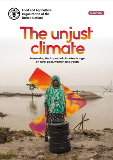
The unjust climate: Measuring the impacts of climate change on the rural poor, women and youth: Summary
2024
"The brief summarizes the key messages and findings of the 'Unjust Climate' report, which measures the impacts of climate change on the rural poor, women, and youths. This report compiles extensive data from 24 low- and middle-income countries across five world regions.
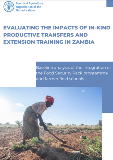
Evaluating the impacts of in-kind productive transfers and extension training in Zambia. Baseline analysis of the integration of the Food Security Pack programme and farmer field schools.
2024
The Government of Zambia has prioritized the scaling up of the Food Security Pack (FSP) to address the economic hardships faced by vulnerable rural households in the context of the COVID-19 pandemic. The baseline report will provide a snapshot of the current socioeconomic conditions of a random sample of 3000 eligible non-beneficiaries, FSP beneficiaries, and FSP+extension services beneficiaries, and will inform the government about its accuracy in their targeting.
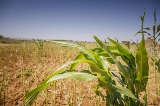
The role of social protection in mitigating the effects of rainfall shocks. Evidence from Ethiopia
2023
We examine how social protection programs in Ethiopia affect smallholder farmers facing adverse rainfall shocks. Our findings show mixed effects: public works reduce productivity, especially during shocks, while free food recipients see higher sales and profits. Cash transfers have a neutral impact on production but increase farming profitability.
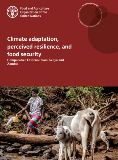
Climate adaptation, perceived resilience, and food security: Comparative evidence from Kenya and Zambia
2023
This study uses comparable data collected in a pastoralist setting in Kenya and a rain-fed crop production context in Zambia to examine the relationship between climate-adaptive practices, food security, and households’ perceived resilience against climatic shocks.
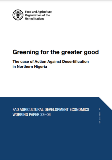
Greening for the greater good. The case of Action Against Desertification in Northern Nigeria.
2023
This suggests that food security support could be strengthened as part of restoration activities and/or that impacts of opportunity-led diversification may need a longer period to accrue. Larger impacts observed within the early takers of the programme reinforce these conclusions. Overall, the analysis also provides an innovative approach to ex-post evaluation settings.
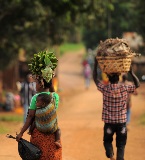
Social Protection and Rural Transformation in Africa. Annual Review of Resource Economics.
2023
This article develops a conceptual framework on pathways through which noncontributory social protection can support resilient and inclusive agricultural growth in rural Africa. It draws insights from a review of rigorous empirical evidence on the impacts of cash transfers and multifaceted cash plus programs on a range of relevant productive outcomes.
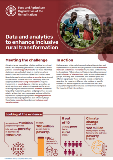
Promoting inclusive climate actions in agrifood systems
2023
Agrifood systems are highly vulnerable to the impacts of climate change, while at the same time they are a major source of greenhouse gas emissions. Climate change could push an additional 100 million people into extreme poverty by 2030 and result in more than 216 million people migrating within their own region by 2050.
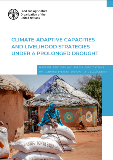
Climate-adaptive capacities and livelihood strategies under a prolonged drought. Baseline findings and policy implications for community-based support in Isiolo, Kenya.
2023
This impact evaluation provides information regarding evaluation design of the “Building back better and greener: Integrated approaches for an inclusive and green COVID-19 recovery in rural spaces” project as well as the baseline survey instrument. Furthermore, it provides details regarding the baseline data collected, conducts balance tests associated with randomization, and provides policy relevant analysis of the baseline.
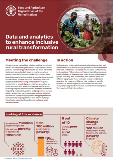
Data and analytics to enhance inclusive rural transformation
2023
Climate change, inequalities, inflation, political unrest and conflict are hampering global efforts to end poverty and to promote economic opportunities for all. These interlinked challenges are particularly acute in rural areas, where poverty rates are three times higher than in urban areas.
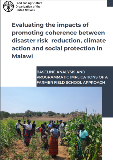
Evaluating the impacts of promoting coherence between disaster risk reduction, climate action and social protection in Malawi. Baseline analysis and programmatic implications of a Farmer Field School approach.
2023
This is a baseline report on the “Promoting coherence between disaster risk reduction, climate action and social protection in sub-Saharan Africa (Malawi)” project.
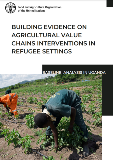
Building evidence on agricultural value chains interventions in refugee settings. Baseline analysis in Uganda.
2023
This baseline report examines the Refugee Agricultural Value Chains for Economic Self-reliance (RAVES) project in Uganda. The programme adopts an innovative approach, with a focus on providing sustainable long-term solutions beyond humanitarian assistance that mitigate the negative effects of displacement, uplift refugees, and support host communities.
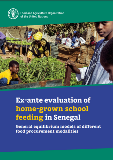
Ex-ante evaluation of home-grown school feeding in Senegal. General equilibrium models of different food procurement modalities.
2023
This report presents the results of a simulation analysis of different food procurement modalities employed by Senegal’s current school feeding programme (SFP) by using local economy-wide impact evaluation (LEWIE). The LEWIE methodology was designed to capture both the direct and the indirect impacts of a wide range of governmental programmes and policies in local economies.
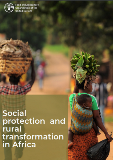
Social protection and rural transformation in Africa
2023
This article develops a conceptual framework on pathways through which non-contributory social protection can contribute to a resilient and inclusive agricultural growth in rural Africa. It draws insights from a review of rigorous empirical evidence on the impacts of cash transfers and multifaceted cash plus programs on range of relevant productive outcomes.
.tmb-th600x450.jpg?Culture=en&sfvrsn=2e1467d4_1)
Local economy-wide impact evaluation of the United Republic of Tanzania’s. Productive Social Safety Nets
2023
To reduce extreme poverty and break its intergenerational transmission, in 2012 the Government of the United Republic of Tanzania initiated the Productive Social Safety Net (PSSN) – the flagship social protection programme implemented by the Tanzania Social Action Fund (TASAF). A randomized impact evaluation was embedded within the scaled-up design of the PSSN. To complement it, in this study we analyse the indirect effects of the PSSN on the overall local economy.
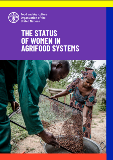
The status of women in agrifood systems
2023
The status of women in agrifood systems report uses extensive new data and analyses to provide a comprehensive picture of women’s participation, benefits, and challenges they face working in agrifood systems globally. The report shows how increasing women’s empowerment and gender equality in agrifood systems enhances women’s well-being and the well-being of their households, creating opportunities for economic growth, greater incomes, productivity and resilience.

